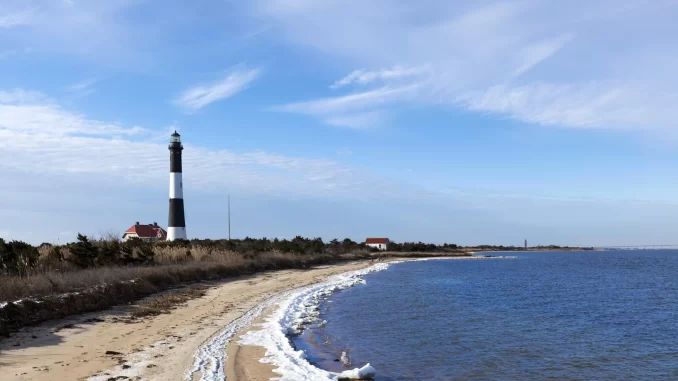
Suffolk County Legislator and Deputy Presiding Officer Steven J. Flotteron (R-West Islip) and Citizens Campaign for the Environment (CCE) Executive Director Adrienne Esposito were joined by Cameron Engineering to deliver the findings of the Fire Island Wastewater Solutions Planning & Engineering Study before the Suffolk County Legislature’s Environment, Parks & Agricultural Committee chaired by Legislator Anthony Piccirillo (R-Holbrook) in Riverhead on June 17.
Flotteron obtained a Suffolk County grant for CCE to hire Cameron Engineering (an IMEG Company) to conduct the first comprehensive assessment of Fire Island’s wastewater challenges and needs. Flotteron and Esposito led the initiative for federal, state, and local leaders, and stakeholder organizations to work collaboratively over the past six years to assess the wastewater management needs of Fire Island.
“This plan is a crucial first step towards solving the unique challenges facing Fire Island’s wastewater management needs,” declared Flotteron. “Fire Island has only one small sewage treatment plant in the Village of Ocean Beach, treating only about 575 parcels. This leaves most residents and numerous tourists to rely on antiquated septic and cesspool systems. These aging systems contribute to water quality impairments, harmful algal blooms, and loss of fisheries in the surrounding waterways, including Great South Bay and Shinnecock Bay.”
“With the options presented by this comprehensive study, we can take the necessary actions to bring solutions for this unique geological water system that protects our waterways, fisheries, and waterfront communities, as well as a thriving tourism industry that brings more than two million visitors to the area each year,” added Flotteron.
Esposito was joined by Stephen Hadjiyane, PE, BCEE, Associate Principal at Cameron Engineering (an IMEG Company), to present the study’s findings to the committee.
“This groundbreaking sewage solutions report takes a holistic approach to managing sewage on Fire Island. This first-of-its-kind report gathered extensive feedback and guidance from stakeholder organizations and Fire Island community members,” Esposito said. “The report identifies solutions tailored for each individual Fire Island community, 17 in total.”
The four main goals outlined at the beginning of the presentation were to: improve wastewater management; identify wastewater treatment/disposal alternative; improve water quality and public health; and develop a ‘road map’ for planning and implementation of solutions.
“This report is a culmination of six years of work and now provides a meaningful blueprint to guide communities in planning for needed wastewater upgrades leading to healthier waters and bays. We are very grateful to Suffolk County Legislator Steve Flotteron for his participation and sponsorship of this valuable project,” added Esposito.
While the report notes that wastewater solutions for Fire Island must overcome some logistical challenges, the findings outline potential treatment alternatives for the area. The challenges begin with limited access to Fire Island from the mainland involving ferries and certain permits from FINS (Fire Island National Seashore), and include challenges within particular communities including varying dock access for community freight and passengers, unique boardwalk and roadway construction and design, narrow streets, and the need for smaller transport vehicles and specialized pump-out vehicles.
Potential wastewater treatment alternatives include: Innovative Alternative Treatment Systems (I/A); an expansion of the Ocean Beach Wastewater Treatment Plant; marine-based alternatives (such as a central pump station and force main under the Great South Bay to the mainland); communal/cluster treatment plant sites; use of FINS property for treatment plant sites; and other innovative technologies such as compost toilets and incineration toilets.

